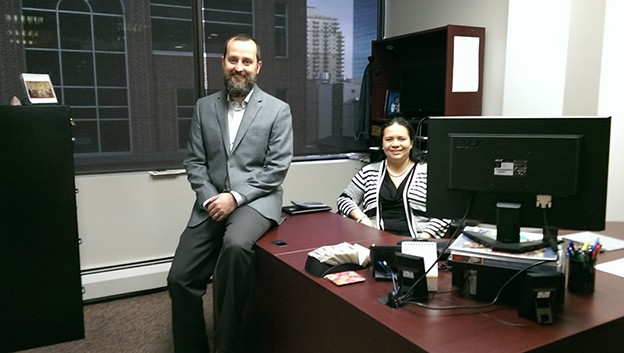Paths to Employment in Canada for Licensed Professionals
Working in the career counselling profession for a combined 25 years, counsellors Deborah Canales and Jesse Morrice have helped hundreds of internationally trained individuals (ITIs) prepare for licensure and employment in Ontario’s regulated professions.
In the following interview, Ms. Canales and Mr. Morrice of the Access Centre for Regulated Employment in London, Ontario discuss some of their practical, informed, and workable approaches to the licensure or certification process in Ontario for internationally trained immigrants.
Thanks to both of you for speaking with us today. We know that many newcomers to Canada are making their way to Ontario and settling in many different communities. Once situated, new immigrants usually start looking for employment, but quickly find that pathways to employment are not always straightforward.
Why do you think that is?
J.M. Definitely, for almost all immigrants, finding employment is a complicated process. In our current labour market, the process of employment is very competitive. It is also a dynamic environment. We are experiencing rapid technological change and we see companies introducing new recruitment methods.
Employers are unlikely to be familiar with education and training programs throughout the world and immigrants are unlikely to be acquainted with credentialing, corporate organization, or job search processes in Canada.
Immigrant professionals in regulated professions are sometimes shocked to learn just how expensive and time-consuming the registration process can be in Ontario.
Immigrant-serving agencies must keep up with all the changes and recruitment trends and realities to effectively serve their clientele, and newcomers must work very hard to learn about employer expectations to be successful when seeking and securing employment. It is a challenge. There are pathways, but they are not always easy to find or follow.
Tell us about your role as you work with internationally trained individuals (ITIs) seeking licensure and employment in Ontario’s regulated fields.
D.C. We help professional newcomers become licensed and employed in Ontario’s regulated fields. That is our area of expertise. We partner with ITIs to build a step-by-step plan based on their prior education and experience. We must remain current regarding licensing processes in all professions because every employment plan should be personalized. Everyone is unique and we work with individuals to help them obtain licenses and employment. Our service delivery is person-to-person.
Understandably, newcomers frequently want to continue doing work they were doing before coming to Canada. Our role is to inform, collaborate, support, interpret, clarify, and advocate for them as effectively as possible. Occasionally we cajole, and hopefully, on occasion, we inspire. We do this so newcomers (as many as possible) can return to professions they know and care about. If we can do that, we know we are helping at the highest level.
The regulatory colleges’ priority is to protect the public interest, and our first responsibility is to offer services and support to individuals as they face an unfamiliar licensure process. Our hope is that licensure leads ITIs to their chosen professions. Immigrants must be given accurate information that relates directly to their own application for licensure. We want to help new immigrants understand why they are taking any of the steps in a process, and facilitating that understanding is a significant part of our role. No one wants to walk blindly into things. We try to ensure that our clients know what is required and why. It’s what anyone would want, and that’s what we try to do.
J.M. The Access Centre always provides information to our clients that is accurate and current. We know clients who have received inaccurate or incomplete information from friends, family or organizations. Recently, a dentist informed me that he wished he had been referred to us sooner because the information he had received was incomplete and cost him considerable time and effort. We are now working to correct his application. If we can work together at the beginning, we make sure the process unfolds correctly, but we can help newcomers wherever they may be in their career path.
 What do you see as the most significant challenges ITIs face as they try to navigate the licensure and employment process in Ontario?
What do you see as the most significant challenges ITIs face as they try to navigate the licensure and employment process in Ontario?
J.M. ITIs routinely identify the following factors as barriers to accreditation/licensure:
- Timely assessment and recognition of qualifications
- Obtaining and understanding available information regarding applying for a licence
- Developing concrete and attainable plans to proceed to licensure and employment
- The cost of completing all the regulator’s requirements (translations, exams, retraining, etc.)
- Lack of local opportunities for training and upgrading
- Finding relevant labour market information
- Lack of information about related employment and other opportunities
- Lack of understanding about how to compete for positions
How much advocacy is involved in your work?
D.C. A great deal and it ranges. We are in touch with the Regulatory Colleges and their third-party assessors. If our clients have questions, we call and ask those questions, unless it is something we already know, and we make it our business to know as much as can be known about licensure in Ontario.
We also help individuals understand the appeals process. We help individuals launch appeals if they have an issue or concern about the process. This is an aspect of the process with which most clients are unfamiliar. Our experience with appeals has been generally positive and we can facilitate appeals efficiently and effectively.
One of our clients was unfamiliar with the appeal process. He didn’t know it was acceptable to appeal. We helped him with a letter and his case was reviewed. Things turned in his favour. That is always wonderful when it happens, and the regulator, in this case, was very helpful and supportive throughout the process.
The costs of the licensure process can sometimes be prohibitive and we can refer individuals for financial support that can help them achieve their licensing and employment goals.
Can you work with anyone who wants to become licensed?
J.M. Not every individual who is internationally trained in a specific occupational sector can qualify as a candidate for licensure in Ontario/Canada, and of course, not everyone who was employed in a regulated profession in their country of origin wants to return to that profession here in Canada.
Depending on the education of the individual, the licensure process might prove simply too long and too costly to undertake. Such individuals will likely benefit from local community-based employment services in seeking employment in a related occupation, and we frequently make referrals to these sites for people needing alternatives.
Fortunately, most regulatory college web sites are very detailed about their application processes and most have specifically targeted information for newcomers. The information is all there. However, we find that information by itself is seldom sufficient. There is a lot to take in, and people often need help figuring it all out to understand what applies to them and what doesn’t.
Changes to how this information is provided have recently been made and many of them directly benefit newcomers. This is thanks to the efforts of the Office of the Fairness Commissioner and the regulators themselves, but many of those changes are largely imperceptible to the client. We are delighted to see any changes that make the processes transparent, objective, impartial, and fair, but there are still many bureaucratic tangles and obstacles that ITIs need assistance to identify and overcome.
Is there evidence to support the idea that ITIs fare better in the labour market with their license or certification?
D.C. Our data suggest that it does. If an individual wants to work as a licensed professional in any of the regulated professions or trades, then, of course, he or she must have a license. Period. Full stop. However, there are certainly those who prefer to work in related roles at some other level. They might be able to do that or they might not. What we have learned is that in these professional fields there are various limiting requirements, and it often isn’t easy simply to apply for work in a lower-level position. A person often still needs to earn a certification to work at lower levels in the professions.
J.M. The Fairness Commissioner has reported that licensing is outpacing employment in Ontario. There are many factors related to employability. Licensing is only one of them. Ultimately, if an ITI hopes to earn a license, it is usually a good idea to start sooner rather than later. In some cases, just having initiated a licensing process can help to increase employability.
For example, the Ontario Society of Professional Engineers conducted research published in their report “From the World to the Workforce: Hiring and Recruitment Perceptions of Engineering Employers and Internationally Trained Engineers in Ontario” (2014). In this study, researchers asked Ontario engineering employers about the importance of Professional Engineers Ontario (PEO) licensure and concluded that “Employers overwhelmingly regard the P.Eng. designation as important, especially for an internationally trained engineer.”
D.C. There’s something else to add. Individuals benefit psychologically. There is so much that changes for newcomers. Imagine it…a new culture, new climate, new house, new government, new streets, new driving rules. So much adjustment is required. Working can be one important source of continuity for newcomers. In work, they have something of their previous experience that remains the same and is valued by the host country. Career continuity is generally very important to well-being…as we can all imagine.
We know that these processes take a long time and are quite expensive to go through. What is your goal as an agency working with and for newcomers?
J.M. When people return to work in commensurate occupations, they’re not the only winners. If they have kids, their kids benefit, too. Companies that employ them benefit and communities benefit. Ultimately, the province and the country benefit. The goal is to maximize employability and productivity of our newest citizens. We all desire that, but we also need it. In one sense, the first step toward that major goal is for an international professional to submit an application to a regulatory body. Nothing can happen if that critical first step is not taken. This launches the licensing process. Then we work together through each subsequent step…exams, interviews, whatever is required. An application sent means something important. It means presenting a case for credential recognition.
In some cases, at a certain point after submitting an application, an employer can search an applicant on a regulatory body’s public register, which may help build confidence in employers by reducing perceived risk.
Basically, if you don’t apply for your driver’s license, you can’t take your road test, and without a road test, there is no license.
As we mentioned earlier, it is important to recognize that some people do not want to apply for licensure or certification. They don’t want to undertake this sometimes complicated and lengthy process. And, that’s fine, but for those who qualify and do want to become licensed, they deserve the opportunity. We recommend and promote licensure as the best way to maximize productivity and security for ITIs and to help build the economic strength of our communities, the province, and our nation.
The help that you offer seems very valuable. Aside from support for licensure or certification, what other aspects of employment do newcomer professionals need to be effective job seekers in this competitive and changing labour market?
D.C. Individuals may need a host of services, including comprehensive and relevant employment preparation, mentorship, and job development, where they can get help marketing themselves effectively to recruiting employers. One service alone is often not enough and newcomers are best served by accessing services designed specifically for immigrant job seekers. The government has invested in newcomer employment, and immigrant job seekers should take advantage of those specific investments whenever possible.
What has experience taught you about what it takes for newcomers to be competitive and obtain licensure and employment in Ontario?
J.M. I think that the first step is to make an informed decision based on current information, motivation, ability to follow through, and financial resources. Once the decision has been made to pursue a license, I think the most important characteristics I’ve seen in successful clients are positivity, professionalism, and resilience. The process takes time and can sometimes involve setbacks and disappointments. Those who stay the course and persevere are often more successful than they might have thought possible at the beginning.
D.C. I agree, Jesse. Another important piece is that people can and should take full advantage of our help and service. We stay very closely connected throughout the process. Questions come up. New possibilities emerge. As I mentioned earlier, we are partners in this process and we want to stay connected start to finish.
Can you tell us a bit about your organization?
J.M. The Access Centre for Regulated Employment is the only provincially funded centre of its kind outside the Greater Toronto Area. Our regional centre serves Southwestern Ontario and provides much-needed licensure and certification information, and application assistance to newcomers seeking careers in Ontario’s regulated professions and trades. We have been at this a long time now, since early 2007, and we know our business. The people who work here are passionate about helping immigrants. Canada has a long-standing commitment to welcoming immigrants and facilitating immigration. In our small way, the Access Centre for Regulated Employment serves this goal, and we are proud of our contribution.
Our project is funded by the Ministry of Citizenship and Immigration and is a cooperative partnership of three local not-for-profit organizations:
- WIL Employment Connections (managing partner)
- London Cross Cultural Learners Centre
- College Boreal d’arts appliques et de technologie
The Access Centre for Regulated Employment is funded by:






